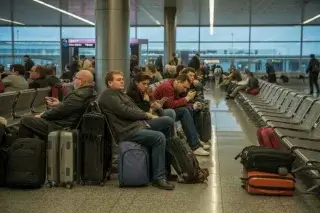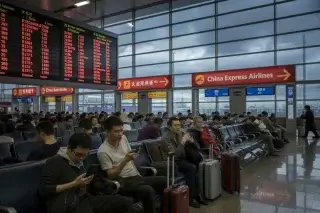Foreigners in Egypt Evicted from Luxury Property: 15 Years After Purchase

Photo: Unsplash
Owners of luxury apartments in Sharm El Sheikh suddenly lost access to their homes. The developer had mortgaged already sold units, and the court transferred the residential complex to another party. The transactions took place more than fifteen years ago, but this did not protect the owners, reports RIA Novosti.
Mortgaged After Sale
The case concerns the Royal Oasis residential complex consisting of 55 apartments. Half of them belonged to Russian citizens, the rest to buyers from the UK, Australia, Hungary, Italy, the USA, Ukraine and Egypt. All units were legally purchased in 2006–2008, and the owners have contracts and registration documents. Despite this, on November 8, 2025, residents were evicted by court order and access to the apartments was blocked.
It turned out that in 2009 the developer took a loan from Housing & Development Bank to build a hotel on the same site. After his death in 2017, the bank demanded repayment of the debt and filed a lawsuit against the heir – the developer’s mother. The collateral included not only the future hotel, but also apartments already sold to private owners. That ultimately led to the transfer of the entire complex to the creditor.
It remains unclear how the bank accepted as collateral property that no longer legally belonged to the developer at the time of the loan. The owners did not take part in the court proceedings and were not a party to the case. Appeals to the governor of South Sinai, the presidential administration, the prime minister and the Egyptian Foreign Ministry brought no results. The owners are now preparing complaints and intend to challenge the eviction.
Property Purchase Rules for Foreigners
Foreigners are allowed to buy residential property in Egypt, but there are quantitative and territorial restrictions. No more than two properties may be owned, with a total land area of no more than 4,000 sq. m. The transaction must be registered in the Real Estate Registry, otherwise the buyer’s legal protection is limited.
Full ownership is available in most Red Sea resorts and major cities. In Sinai, a different mechanism applies: buyers usually receive long-term lease rights for up to 99 years instead of freehold ownership.
The purchase requires security clearance, as well as proof of funds transferred from abroad. Registration fees amount to around 1% of the property price, and legal services cost approximately the same. Rental income is taxed at up to 22.5%.
Risks for Investors
The Egyptian authorities are actively attracting foreign buyers and easing acquisition procedures. However, the market remains opaque, and the risk of running into fraudulent schemes is still high. The lack of a unified system for title registration and legal verification means that even a properly executed transaction does not guarantee protection. In many cases, ownership is formally registered only after construction is completed, increasing investors’ exposure.
Another factor is the volatile Egyptian pound. Repeated devaluations over the past two years complicate return calculations and may require revising financial terms even after signing the purchase agreement. The regulatory environment remains fragmented: government initiatives, export schemes and developer incentives often overlap, creating legal uncertainty. Deals may rely not on institutional guarantees but on personal arrangements, increasing transactional risks.
Systemic Problems
Over the past two years, residential property in Egypt has increased in price by 20–30% due to rising construction costs and speculative reservations that do not always result in actual sales. If external demand weakens, the market may face a temporary overvaluation, especially in the premium segment. Project delays without compensation extend the payback period and increase risks for foreign buyers.
The Royal Oasis case has become another example where legally registered ownership is effectively lost. Contract registration and documents do not protect the buyer if the property is tied to hidden debt or collateral disputes.
Analysts at International Investment note that a combination of currency instability, legal opacity and cases like Royal Oasis make Egyptian real estate a high-risk asset. Without institutional reforms, the market will depend not on legal guarantees but on the decisions of officials and the developer’s ability to negotiate.
Подсказки: Egypt, real estate, investors, property rights, Sharm El Sheikh, Royal Oasis, foreign buyers, eviction, legal risks, housing market








